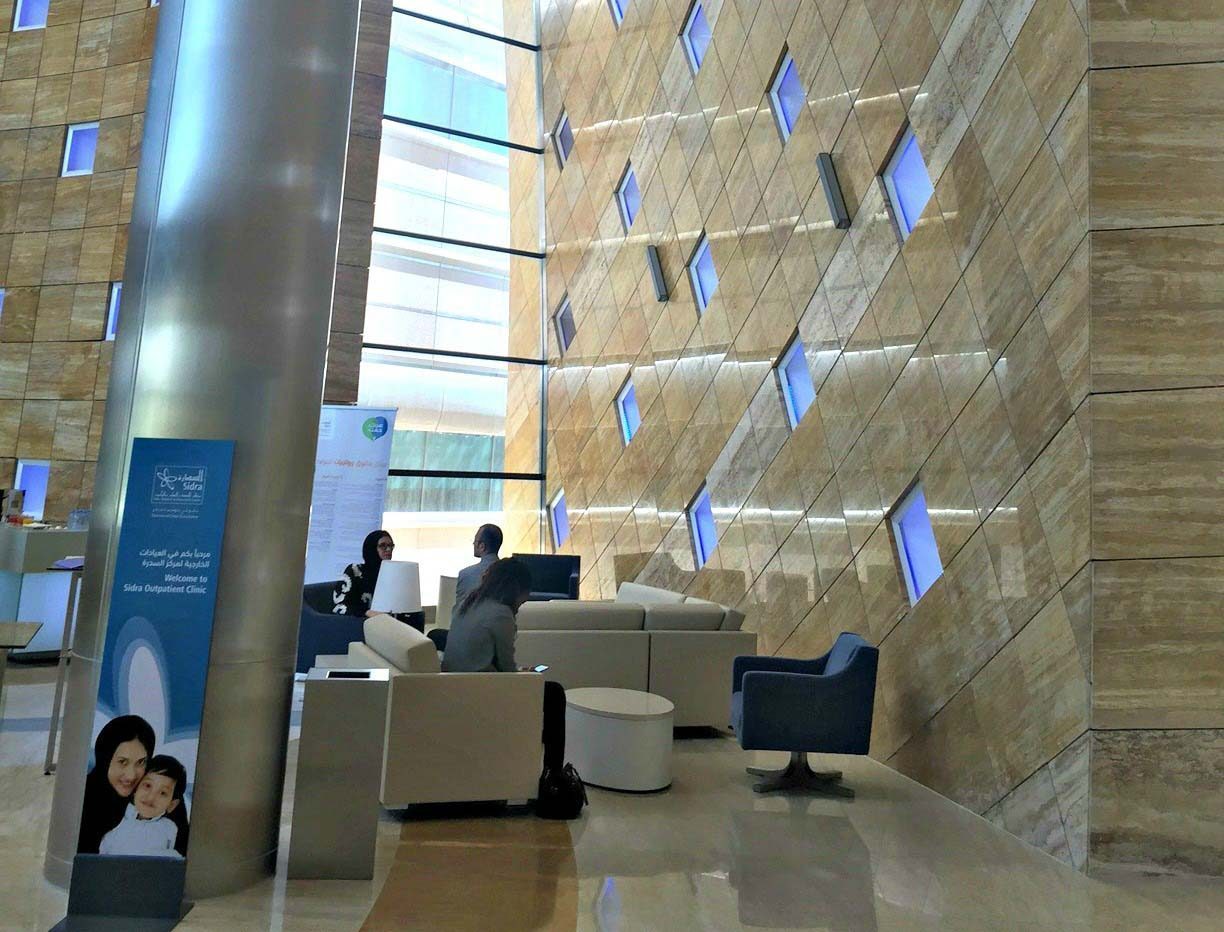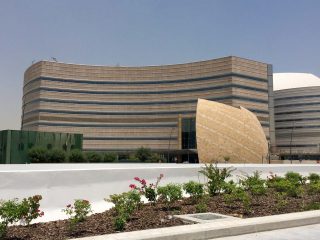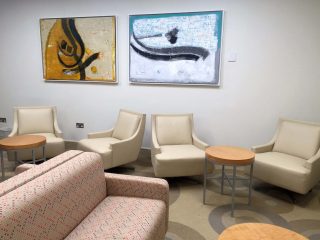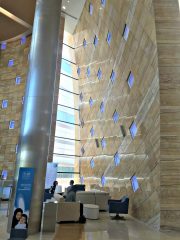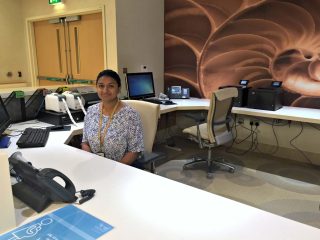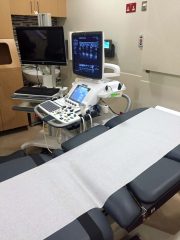All photos by Lesley Walker
Ahead of the first stage of its long-awaited opening next week, officials at Sidra Medical and Research Center have offered a preview of what patients can expect.
Starting Sunday, May 1, just three clinics will begin accepting patients in what officials said will be a gradual launch of the entire outpatients department.
Up to approximately 40 clinics will be open when the unit is fully operational early next year, they added.
At that time, the outpatients department will be able to see up to 5,000 patients each week, or up to 260,000 a year, as part of a plan to relieve key under-pressure facilities at Hamad General Hospital.
In a few days’ time, pediatric general surgery consultation, obstetrics and dermatology will be the first wave of clinics to open. Offerings will also include radiology, pathology, pharmacy and laboratory services.
This will be followed shortly by more pediatric services, including:
- Neonatology consultation;
- Developmental pediatrics;
- Child and adolescent mental health;
- Ear, nose and throat (ENT); and
- Pre-operative anesthetic assessment and preparation.
No detailed timeline has yet been released for the opening of these and the other clinics planned for the center.
However a Sidra spokesperson said new clinics would be announced and opened each month.
The Qatar Foundation-funded project, located next to the Qatar National Convention Center (QNCC), is designed to be a regional center of excellence for the care of women and children.

However, the project has been beset by several issues that have put it years behind its initial 2011 launch, with many missed deadlines after that.
Sidra officials declined to say when the whole hospital would be fully operational, but vice president Lord Darzi said last summer that it could be 2019 before the center is able to conduct in-patient operations.
Here are some of the key things to know about the center, which is open to both men and women:
You will need a referral
All patients attending the hospital will have to be referred there by a doctor.
Initially, this can only be done for patients who are being seen by medical staff in Qatar’s state health system – either Hamad Medical Corp. (HMC) or the Primary Health Care Corporation (PHCC).
There will be no self-referrals, walk-ins or emergency facilities at the outpatient department.
“Patients should not come to Sidra if they do not have a referral from their existing healthcare practitioner from HMC or PHCC,” Sidra said in a statement.
In the first stages of the opening, patients cannot be referred from the private sector, although this will change in the future, Sidra said.

At first, children can be referred either from their HMC or PHCC physician (including doctors at the Pediatric emergency centers) depending on their condition and whether the appropriate clinics are open at Sidra to treat them.
Pregnant women who are in the HMC system will be triaged by HMC and Sidra doctors to determine where they will receive pre-natal care (either at a Hamad hospital or Sidra).
As there are no delivery suites open at the outpatient clinic, women who receive pre-natal care at Sidra would be transferred back to Hamad Women’s Hospital for the birth of their babies.
All out-patient clinics will run from 7am until 3pm on weekdays.
You will need to pay for services
There will be fees to use the services at the center, and these will be charged in a number of different ways.
Qataris can use their existing Hamad medical card for payment until a new insurance program for nationals has been developed.
Non-Qataris who have a residency permit will be asked to fund their treatment through private insurance, if they have it.
If the services they need at Sidra are not available anywhere else in the country, the patient does not have insurance or they have exhausted their coverage, they may be able to use their Hamad medical card.
However, expats using a Hamad health card would have to provide proof from their sponsor that they have no other insurance.
Sidra has not published the prices for its services yet, but said that fees for those using an HMC card will be similar to those charged at HMC facilities.
If there is no direct billing arrangement between Sidra and a patient’s insurer, patients should pay at the time of their appointment, then arrange with their insurer to be reimbursed.
Credit and debit cards will be accepted. Cash payments are currently being phased out of state healthcare facilities.
Pediatrics is high-tech
A pediatric surgery clinic and a dermatology clinic will be the first two children’s services to open at the center.

Units are fitted with the latest technology, including palm scanners that can read the veins in the patient’s palms for quick and accurate identification.
Devices will be used to check height, weight and temperature, and this data will be sent directly to the patient’s digital file.
Patient consultation rooms are designed to be what Sidra officials call “family-centered,” with patients staying in one room and clinical staff seeing them there.
“The therapists come to you (the patient). Even blood work can be done close by. This will be a ‘one-stop’ service. There won’t be lots of to-ing and fro-ing for patients,” said Dr. David Sigalet, medical director and chief of surgery of the Sidra Outpatient Clinic during a media tour yesterday.
Eventually, many of the clinics currently running at HGH will transfer to Sidra although others such as rehabilitation and dialysis will stay at Hamad, Sigalet added.

The diagnostics wing of the clinic includes two X-ray rooms, five ultra-sound rooms, one MRI scanner and one CT scanner specifically adapted for children so that they can select a theme that is projected on the walls and ceiling.
Up to 80 patients a day can be treated in this facility, Pamela Berekoff, director of radiology said.
The clinic will also have the first 3D printer in a children’s hospital in the Gulf.

Using scan data, it can produce models of parts of the body that can help surgeons plan operations and be used to explain to patients what will happen to them.
It will also help produce customized casts, to ensure optimized healing for broken bones.
Prenatal care is available
The Obstetrics and Gynecology clinic on the center’s fourth floor is dedicated to providing prenatal care for pregnant women.

There are:
- Six treatment rooms for minor procedures;
- 44 consulting rooms; and
- Three cardiotocography (CTG) beds in an open bay to record fetal heartbeat, as well as two private CTG rooms.
By Eid, the clinic expects to see around 150 patients a month, rising to 500 a month by the end of the year.
There’s a whole floor for research
The top two floors of the six-story building houses research laboratories that will serve as a hub for biomedical research in Qatar.

There are currently 127 researchers based there, which is set to rise to 400 as more labs open up. Ongoing projects include cancer, preterm birth and genetic disorders.
The floor will also house research laboratories and technologies that support the Qatar Genome Project. Sidra’s genomics team and facilities will move from its current site at Qatar Biobank in Hamad Medical City back to the Sidra Outpatient Clinic.
Thoughts?

